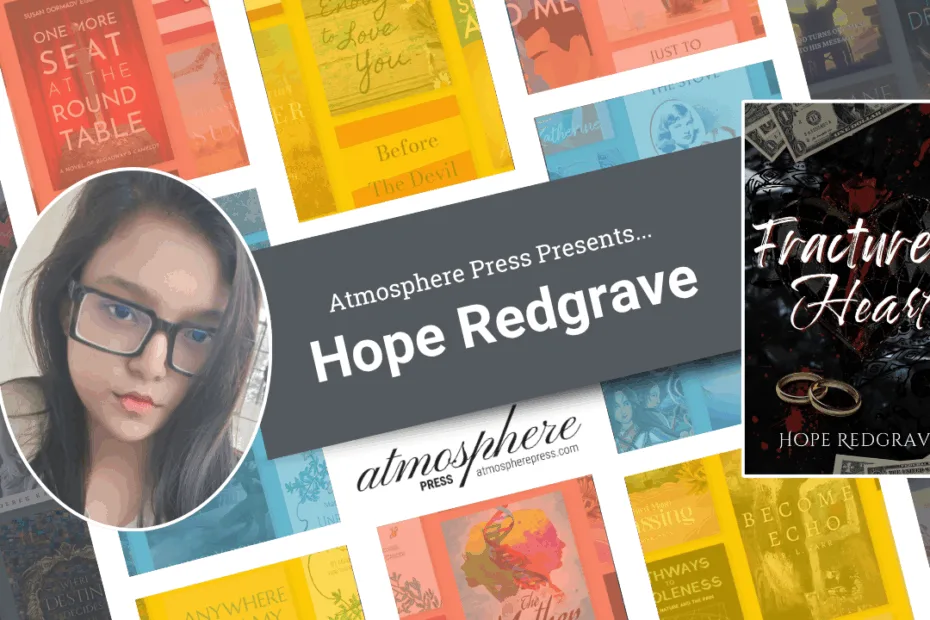An Interview with Hope Redgrave

Hope Redgrave is a twenty-two-year-old university student who initially developed her love of writing through fanfiction at age seventeen. Stress from studies suppressed that flame briefly, but she reclaimed it in her university life. Writing was her go-to refuge – her means of world-building outside lecture theaters and deadline projects.
By day, Hope is a student juggling lectures, quizzes, and the occasional existential crisis. By night, she transforms into a storyteller – crafting scenes, developing characters, and editing into the early hours. When she’s not lost in her latest manuscript, you’ll likely find her singing to her favorite tunes, dancing around her room, or getting lost in the strokes of a new painting.
As an anime enthusiast, Hope is likely to take inspiration from the emotional depth, world-building, and character work she finds in her favorite shows. Whether sobbing over a season finale or raging about plot twists, anime has made a huge impact on how she thinks about storytelling – and it’s reflected in her writing.
Who/what made you want to write? Was there a particular person, or particular writers/works/art forms that influenced you?
I think I’ve always written. Even before I knew what ‘writing’ really was. I used to scribble dialogues and stories about people who hurt and healed in the same breath. What made me want to write was friendship, really. The kind of bond that shapes you, breaks you, and still lingers in every corner of your heart. That emotional intensity… that’s what I wanted to capture in words.
What other professions have you worked in? What’s something about you that your readers wouldn’t know?
I’m still a student – an engineering one at that – so my life is this funny balance of circuits by day and love stories by night. Readers probably wouldn’t know that I tend to write my most emotional scenes during thunderstorms or at four a.m. when everything feels louder in silence and the night is just a tad bit darker.
Tell us the story of your book’s title. Was it easy to find, or did it take forever?
Fractured Hearts came to me pretty naturally. It felt…right. The story was always about love that’s imperfect. Incomplete. People who are cracked in places but still find ways to fit together. It wasn’t just a title for me. It was a feeling. Every draft, every rewrite, kept circling back to that one word. Fractured. Because that’s what we are when we love too deeply. Beautiful, broken and ultimately…human.
What part of publishing your book made it feel real for the first time?
Seeing the cover. That specific moment when all the emotions I’d carried in my head for so long had a life…a heartbeat outside my imagination. It’s surreal…like watching your memories turn into something the whole world can now hold.
If your book had a soundtrack, what are some songs that would be on it?
Every chapter of Fractured Hearts has a heartbeat. And it has a soundtrack which sounds like this:
Would You Fall in Love With Me Again – EPIC: The Musical
If I Could Fly – One Direction
Lovely – Billie Eilish and Khalid
Die With a Smile – Lady Gaga and Bruno Mars
Talking to the Moon – Bruno Mars
Let the World Burn (Remix) – Chris Grey ft. G-Eazy and Ari Abdul
Each song feels like a fragment of Marco and Rose. They are tender, aching, and just a little – or maybe a lot – doomed.
What’s one thing you hope sticks with readers after they finish your book?
That love doesn’t have to be perfect to be powerful. That sometimes, fate wins against love. And that it’s okay to be broken. Because being fractured doesn’t mean you can’t still fight to heal.
What was the most rewarding/meaningful part of publishing your book?
Hearing from readers who said they saw themselves in it. That’s everything. Every message, every tearful ‘thank you,’ reminds me that maybe all the heartbreak I wrote wasn’t for nothing. It found a home somewhere.
What creative projects are you currently working on?
Right now, I’m still living in the afterglow and aftermath of Fractured Hearts. But the next story of this series, Shotguns and Roses, is already forming. It’s darker and sharper around the edges. But it’s still rooted in the same thing that started it all. Love that refuses to lose.
Are you a writer, too? Submit your manuscript to Atmosphere Press.

Atmosphere Press is a selective hybrid publisher founded in 2015 on the principles of Honesty, Transparency, Professionalism, Kindness, and Making Your Book Awesome. Our books have won dozens of awards and sold tens of thousands of copies. If you’re interested in learning more, or seeking publication for your own work, please explore the links below.
